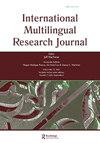What the “periphery” can teach the “core” in the education of multilingual learners
IF 2.1
1区 文学
Q2 EDUCATION & EDUCATIONAL RESEARCH
引用次数: 1
Abstract
ABSTRACT The contributors to this special issue make a compelling case for paying greater attention to multilingual learners (MLs) in ”peripheral“ (i.e., beyond the ”core”) educational settings, including in art, drama, museum, career and technical, and world language education. In this commentary, I build on and extend their argument by proposing that a focus on the periphery has the potential not only to shine a light on settings that have received less attention in research to date, but also to help rethink the education of MLs more broadly. Specifically, lessons from the periphery about what makes learning deep for MLs could offer a fresh perspective on core content areas, such as science, mathematics, language arts, and social studies, that have been somewhat resistant to change in their purposes and structures over time. Grounded in contemporary theoretical perspectives in language education, I propose four lessons that the periphery could teach the core in the education of MLs: (a) establishing authentic purposes and audiences, (b) creating communities of practice, (c) cultivating learners’ identities, and (d) promoting multiple modalities of expression. Ultimately, this commentary seeks to initiate a dialogue between educators in the periphery and those in the core toward developing a collective vision of what it might look like to provide MLs with the deep, personally meaningful, and equitable school experiences they deserve.在多语言学习者的教育中,“边缘”能教给“核心”什么
摘要本期特刊的撰稿人提出了一个令人信服的理由,即在“外围”(即“核心”之外)教育环境中,包括在艺术、戏剧、博物馆、职业和技术以及世界语言教育中,更多地关注多语言学习者。在这篇评论中,我在他们的论点的基础上提出,对边缘地区的关注不仅有可能照亮迄今为止在研究中较少受到关注的环境,而且有助于更广泛地重新思考MLs的教育。具体而言,来自外围的关于MLs深度学习的经验教训可以为核心内容领域提供一个新的视角,如科学、数学、语言艺术和社会研究,这些领域在一定程度上抵制其目的和结构随时间的变化。基于当代语言教育的理论视角,我提出了四个边缘可以在MLs教育中教授核心的课程:(a)建立真实的目的和受众,(b)创建实践社区,(c)培养学习者的身份,以及(d)促进多种表达方式。最终,这篇评论试图在边缘教育工作者和核心教育工作者之间发起对话,以发展一种集体愿景,即为MLs提供他们应得的深刻、有个人意义和公平的学校体验。
本文章由计算机程序翻译,如有差异,请以英文原文为准。
求助全文
约1分钟内获得全文
求助全文
来源期刊
CiteScore
4.10
自引率
4.80%
发文量
19
期刊介绍:
The International Multilingual Research Journal (IMRJ) invites scholarly contributions with strong interdisciplinary perspectives to understand and promote bi/multilingualism, bi/multi-literacy, and linguistic democracy. The journal’s focus is on these topics as related to languages other than English as well as dialectal variations of English. It has three thematic emphases: the intersection of language and culture, the dialectics of the local and global, and comparative models within and across contexts. IMRJ is committed to promoting equity, access, and social justice in education, and to offering accessible research and policy analyses to better inform scholars, educators, students, and policy makers. IMRJ is particularly interested in scholarship grounded in interdisciplinary frameworks that offer insights from linguistics, applied linguistics, education, globalization and immigration studies, cultural psychology, linguistic and psychological anthropology, sociolinguistics, literacy studies, post-colonial studies, critical race theory, and critical theory and pedagogy. It seeks theoretical and empirical scholarship with implications for research, policy, and practice. Submissions of research articles based on quantitative, qualitative, and mixed methods are encouraged. The journal includes book reviews and two occasional sections: Perspectives and Research Notes. Perspectives allows for informed debate and exchanges on current issues and hot topics related to bi/multilingualism, bi/multi-literacy, and linguistic democracy from research, practice, and policy perspectives. Research Notes are shorter submissions that provide updates on major research projects and trends in the field.

 求助内容:
求助内容: 应助结果提醒方式:
应助结果提醒方式:


